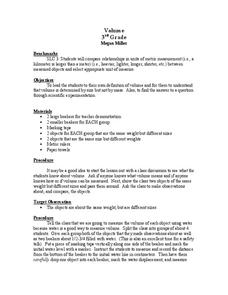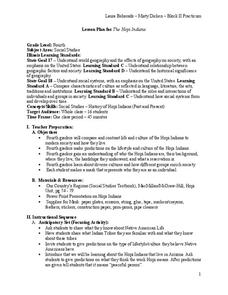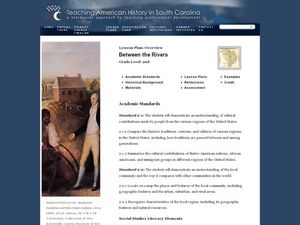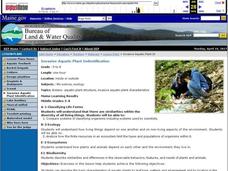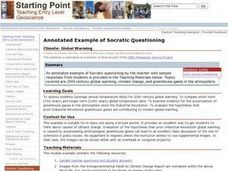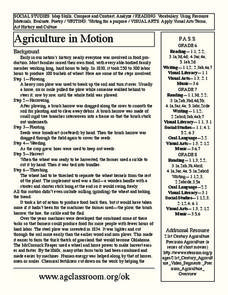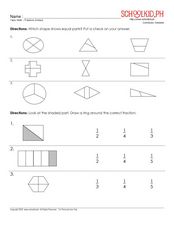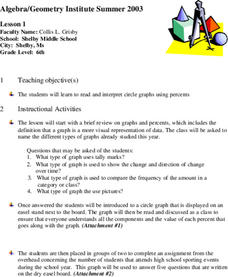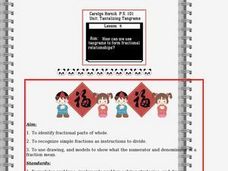Curated OER
Meter Marker Mania
Pupils identify integers as rational and irrational numbers. For this algebra lesson, students measure and construct number lines using positive and negative integers. They convert between decimals and fractions.
Curated OER
Sharpen Your Skills: Worksheet 9
This worksheet is a mix of math skills directed at fifth graders. They will compare sets of numbers that include whole numbers, decimals, and fractions to order them from smallest to largest. The page concludes with a review of...
Curated OER
The Gingerbread Man
For this unit students use the traditional tale of the gingerbread man as a context for ordering and comparing lengths. They compare the length of two objects directly, order three or more objects by length and select objects that are...
Helping with Math
Identifying and Writing Decimals up to Thousandths
A simple learning exercise asks learners to write five numbers in decimal form. Sets of blocks represent the numbers and include whole number blocks, tenths, hundredths, and thousandths. Use this to follow other worksheets by the same...
Curated OER
Volume
Third graders complete scientific investigation to determine what volume is and how it is determined by size not by mass. They discuss what they know about volume before proceeding with the demonstration and experimentation. After the...
Curated OER
Collecting Data and Graphing
Students practice collecting and graphing data using interlocking cubes. In this graphing instructional activity, partners count cubes and graph them. They also use a meter stick to measure arm span and height then compare the results...
Curated OER
The Hopi Indians
Fourth graders make a mask of who they are as an individual after studying the Hopi Indians. In this Hopi Indians lesson plan, 4th graders compare and contrast the Hopi life with theirs, make predictions, and learn about culture.
Curated OER
Between the Rivers
Second graders compare and contrast historical American cultures. In this American history activity, 2nd graders participate in reading, writing, oral, and hands on activities. Students discuss the similarities and differences between...
Curated OER
Invasive Aquatic Plant Identification
Students observe aquatic plants and animals and identify their systems. In this plants and animals lesson plan, students compare systems of organisms and orally express how plants and animals rely on each other.
Curated OER
Annotated Example of Socratic Questioning: Climate: Global Warming
Students compare and discuss short-term and longer-term global temperature data. They evaluate data from three sets of graphs and then participate in a structured whole class Socratic discussion on the possible causes of climate change.
Curated OER
Agriculture in Motion
Sixth graders write a poem and an essay about the machines they have learned about that are used in agriculture. In this machines lesson plan, 6th graders compare different kinds of machines and discuss the economic impact machines in...
Curated OER
It's a Drag!
Students create number lines using decimals and whole numbers. In this algebra lesson, students graph and solve linear equations. They plot ordered pairs on a coordinate plane correctly.
Curated OER
Fractions (Unitary)
In this fraction worksheet, students determine which shape is divided into equal parts and check their answer. Students then look at shaded parts of a whole and circle the correct fraction. Finally, students determine the fraction for...
Curated OER
The Queen of Sheba
Pupils discuss various versions of the myth of The Queen of Sheba and the basic characteristics of myths. They research how different cultures interpret the story and include it in their religious beliefs. They create projects about the...
Curated OER
Circle Graphs
Sixth graders participate in a lesson that covers the reading and interpretation of a circle graph. They review the part of a whole concept for percents and student observe and practice using the circle graph.
Curated OER
Parental Responsibilities
Students discuss their responsibilities and experiences as parents. Individually, students create a list of parental responsibilities. Individual lists are combined and discussed with the whole class. This lesson is designed for...
Curated OER
Density
Second graders watch a demonstration and complete an experiment to determine how an objects' density allows it to float or sink. They work in small groups to assimilate the characteristics of items that float as opposed to simply...
Curated OER
Body Organization and Organ Systems
Eighth graders begin the lesson by building a house of cards. They discuss ways that building a house of cards is similar to the way the body is built: different systems work together to help the whole body work together. Students listen...
Curated OER
Map Your House
Learners are introduced to the concepts of maps as scale models of the whole. After a brief lecture on creating and using an accurate scale when drawing and reading a map. They create a scale drawing of the floorplan of their homes.
Curated OER
Of Mice and Men by John Steinbeck
Here's an illustrated Of Mice and Men worksheet that asks readers to respond to five short answer prompts and complete 4 graphic organizers designed to be used prior to reading, while reading, and after reading Steinbeck's Of Mice and...
Curated OER
Relative Dating in Archaeology
Students create a timeline that explains how ancient cultures used artifacts. In this Relative Dating in Archaeology lesson, students examine artifacts and draw conclusions about their origins. Then students analyze antiquated objects or...
Curated OER
Seasons
Students name the 4 seasons, discussing the weather, plant life, animal life and and activities of each. Students read the book titled, "Hello Arctic," and and discuss changes in seasons that accompany the story. Students complete...
Curated OER
Tantalizing Tangrams: Fractional Relationships
Students use tangrams to represent parts of a whole. In this fraction lesson, students use tangrams to determine fractional relationships between different pieces. Students use the AppleWorks drawing application to demonstrate the...
Curated OER
Factors, Divisibility, and Relatively Prime
Seventh graders explore the concept of divisibility. In this divisibility lesson, 7th graders use divisibility rules to find factors of numbers. Students create foldables to illustrate divisibility rules.






